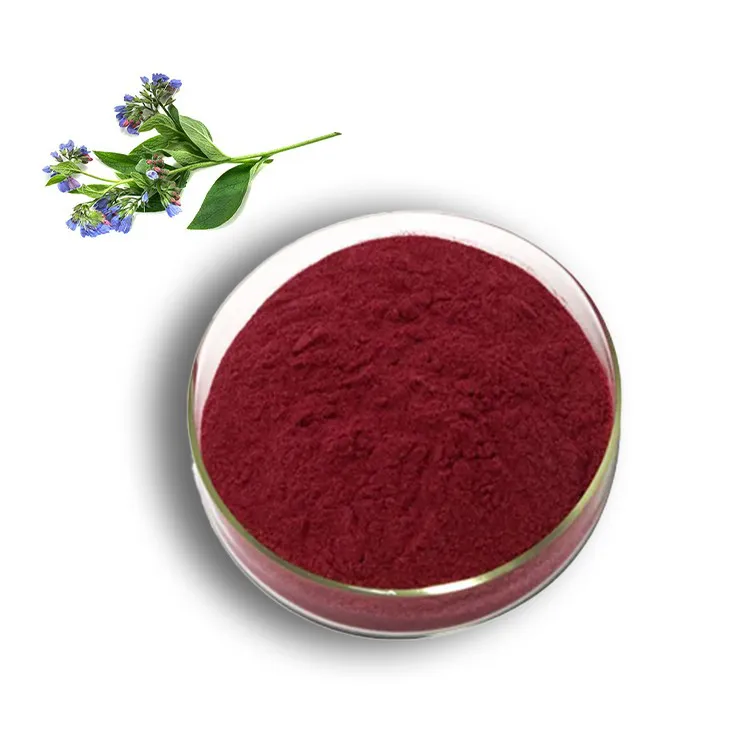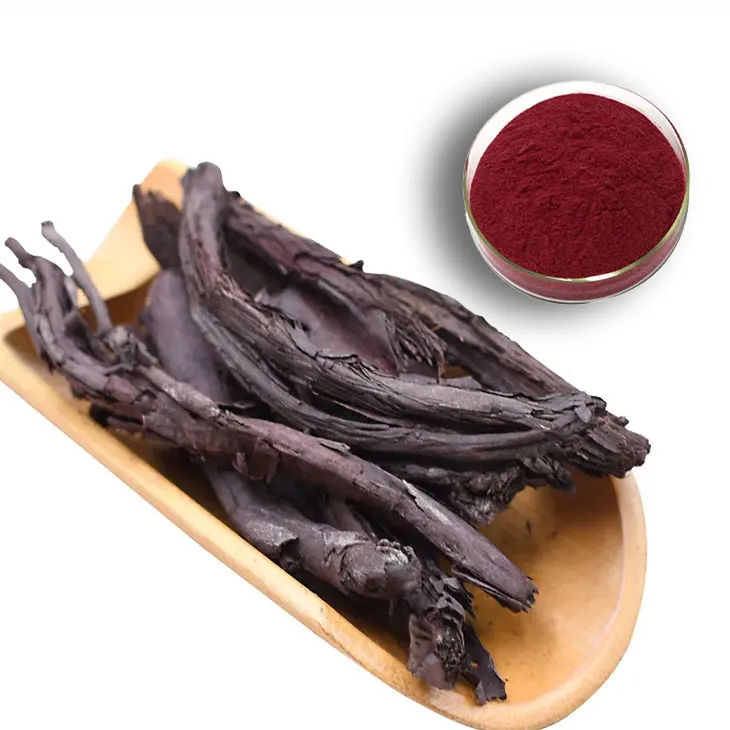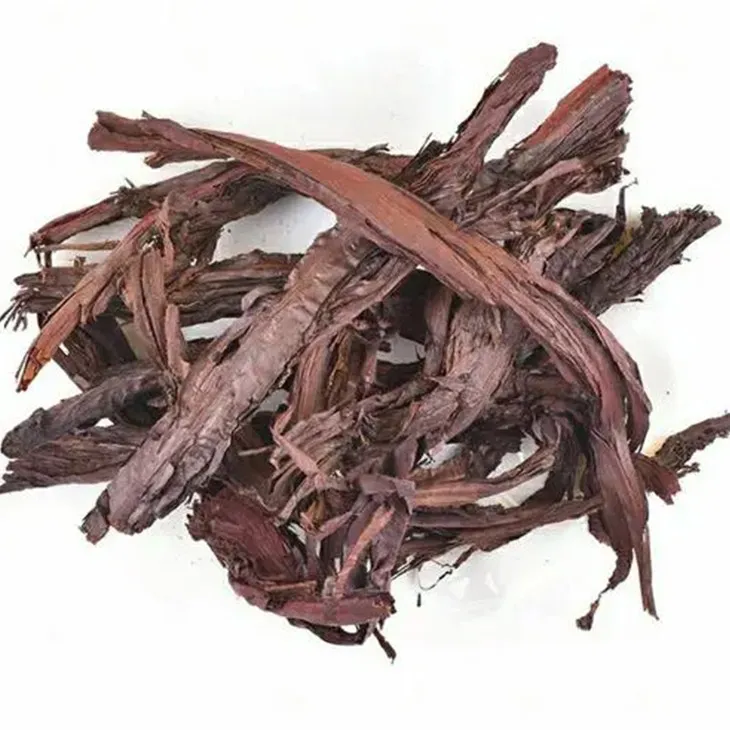- 0086-571-85302990
- sales@greenskybio.com
Uncover the Secret: 8 Reasons You Must Know about Shikonin.
2024-12-21

1. Introduction to Shikonin
Shikonin is a compound that has been drawing significant attention in the scientific and medical fields. It is a natural product with a wide range of properties that make it a subject of great interest for researchers. Shikonin has been isolated from plants of the Boraginaceae family, and its unique chemical structure endows it with various biological activities.

2. Antioxidant Capacity
One of the most important aspects of shikonin is its antioxidant capacity. In the human body, free radicals are constantly produced as a by - product of normal metabolic processes. However, an excessive amount of free radicals can lead to oxidative stress, which is associated with a variety of diseases, including cardiovascular diseases, neurodegenerative disorders, and cancer.
Shikonin helps to neutralize free radicals. It does this by donating an electron to the free radicals, thereby making them less reactive. This antioxidant property of shikonin is crucial for maintaining the balance of the body's internal environment. For example, in vitro studies have shown that shikonin can effectively scavenge reactive oxygen species (ROS) such as superoxide anions and hydroxyl radicals.

3. Anti - Inflammatory Properties
Shikonin also exhibits remarkable anti - inflammatory performance. Chronic inflammation is a key factor in many diseases, such as rheumatoid arthritis, inflammatory bowel disease, and asthma.
The anti - inflammatory mechanism of shikonin is complex. It can inhibit the activation of inflammatory cells, such as macrophages and neutrophils. For instance, shikonin has been shown to down - regulate the expression of pro - inflammatory cytokines, including interleukin - 1β (IL - 1β), interleukin - 6 (IL - 6), and tumor necrosis factor - α (TNF - α). This reduction in cytokine expression helps to dampen the inflammatory response in the body.

4. Role in Dermatology
In dermatology, shikonin has a profound impact on skin regeneration. Skin problems are common and can range from minor issues like acne to more severe conditions such as burns and ulcers.
Shikonin promotes the proliferation of skin cells, such as keratinocytes and fibroblasts. This helps in the repair and regeneration of damaged skin. It also has anti - microbial properties in the context of skin health, which can prevent infections in skin wounds. Additionally, shikonin can modulate the immune response in the skin, reducing inflammation and promoting healing. For example, in some studies on skin ulcers, shikonin - based formulations have shown to accelerate the healing process by enhancing tissue granulation and epithelialization.
5. Anti - Cancer Potential
The anti - cancer properties of shikonin are currently being studied intensively. Cancer is a complex disease that requires multi - faceted approaches for treatment.
Shikonin has been shown to have anti - proliferative effects on cancer cells. It can induce cell cycle arrest in cancer cells, preventing them from dividing uncontrollably. Moreover, shikonin can trigger apoptosis, or programmed cell death, in cancer cells. For example, in studies on breast cancer cells, shikonin has been demonstrated to disrupt the mitochondrial membrane potential, leading to the release of cytochrome c and activation of caspases, which are key players in the apoptotic pathway. However, more research is needed to fully understand its potential and to develop it into an effective anti - cancer drug.
6. Antimicrobial Activity
Shikonin's antimicrobial property enables it to resist the invasion of a wide range of pathogens. In the era of increasing antibiotic resistance, finding new antimicrobial agents is of utmost importance.
Shikonin has been shown to be effective against bacteria, fungi, and viruses. For bacteria, it can disrupt the bacterial cell membrane, leading to leakage of intracellular components and ultimately cell death. Against fungi, shikonin can interfere with fungal cell wall synthesis or membrane integrity. In the case of viruses, it may inhibit viral entry into host cells or viral replication within the cells. For example, some research has indicated that shikonin can inhibit the growth of Staphylococcus aureus, a common pathogen causing skin and soft tissue infections, as well as Candida albicans, a major fungal pathogen.
7. Immunomodulation
Shikonin also has a role in immunomodulation. The immune system is a complex network that needs to be in balance to maintain good health.
Shikonin can enhance the function of immune cells, such as lymphocytes and dendritic cells. It can also regulate the production of antibodies and cytokines. By modulating the immune system, shikonin may help the body to better defend against infections and diseases. For example, in some animal models, shikonin treatment has been shown to increase the production of interferon - γ (IFN - γ), an important cytokine for antiviral and anti - tumor immunity.
8. Traditional Medicinal Use
Historically, shikonin has been used in traditional medicine. This long - standing use in traditional medicine implies its reliability to some extent.
In traditional Chinese medicine, plants containing shikonin have been used for treating various ailments, such as skin diseases, burns, and internal bleeding. The knowledge and experience accumulated over centuries in traditional medicine provide a valuable foundation for modern research on shikonin. Although traditional medicine uses are not always based on a complete understanding of the underlying mechanisms, they can serve as a starting point for further scientific investigations.
9. Future Research
Currently, ongoing research on shikonin is likely to disclose more valuable information. Scientists are constantly exploring new aspects of shikonin's properties and potential applications.
Future research may focus on improving the delivery methods of shikonin to target tissues more effectively. For example, developing new drug formulations such as nanoparticles loaded with shikonin to enhance its bioavailability. Additionally, more in - vivo studies are needed to fully evaluate its safety and efficacy in living organisms. There is also potential for exploring the combination of shikonin with other drugs to achieve better therapeutic effects in treating complex diseases.
FAQ:
Q1: What is shikonin?
Shikonin is an important compound in the scientific and medical fields.
Q2: What are the antioxidant benefits of shikonin?
Shikonin has antioxidant capacity. It helps to neutralize free radicals and prevent oxidative stress in the body.
Q3: How does shikonin perform in anti - inflammation?
Shikonin exhibits remarkable performance in anti - inflammation and may be effective in treating chronic inflammatory diseases.
Q4: What is the role of shikonin in dermatology?
In dermatology, shikonin has a profound impact on skin regeneration and contributes to the treatment of skin problems.
Q5: Is shikonin being studied for cancer treatment?
Yes, the anti - cancer properties of shikonin are being studied intensively, showing potential in cancer treatment.
Q6: What about shikonin's antimicrobial property?
Shikonin has an antimicrobial property which enables it to resist the invasion of a wide range of pathogens.
Related literature
- Shikonin: A Review of Its Pharmacological Properties and Therapeutic Potential"
- "The Role of Shikonin in Immunomodulation: Current Research and Future Perspectives"
- "Shikonin and Skin Health: Mechanisms and Applications"
- ▶ Hesperidin
- ▶ Citrus Bioflavonoids
- ▶ Plant Extract
- ▶ lycopene
- ▶ Diosmin
- ▶ Grape seed extract
- ▶ Sea buckthorn Juice Powder
- ▶ Fruit Juice Powder
- ▶ Hops Extract
- ▶ Artichoke Extract
- ▶ Mushroom extract
- ▶ Astaxanthin
- ▶ Green Tea Extract
- ▶ Curcumin
- ▶ Horse Chestnut Extract
- ▶ Other Product
- ▶ Boswellia Serrata Extract
- ▶ Resveratrol
- ▶ Marigold Extract
- ▶ Grape Leaf Extract
- ▶ New Product
- ▶ Aminolevulinic acid
- ▶ Cranberry Extract
- ▶ Red Yeast Rice
- ▶ Red Wine Extract
-
Echinacea Extract
2024-12-21
-
Grape Leaf Extract
2024-12-21
-
Grapefruit Seed Extract Powder
2024-12-21
-
Alisma Extract
2024-12-21
-
Peppermint Oil
2024-12-21
-
Shikone Extract
2024-12-21
-
Sea buckthorn oil
2024-12-21
-
Cat Claw Extract
2024-12-21
-
Sophora Japonica Flower Extract
2024-12-21
-
Aminolevulinic acid
2024-12-21





















